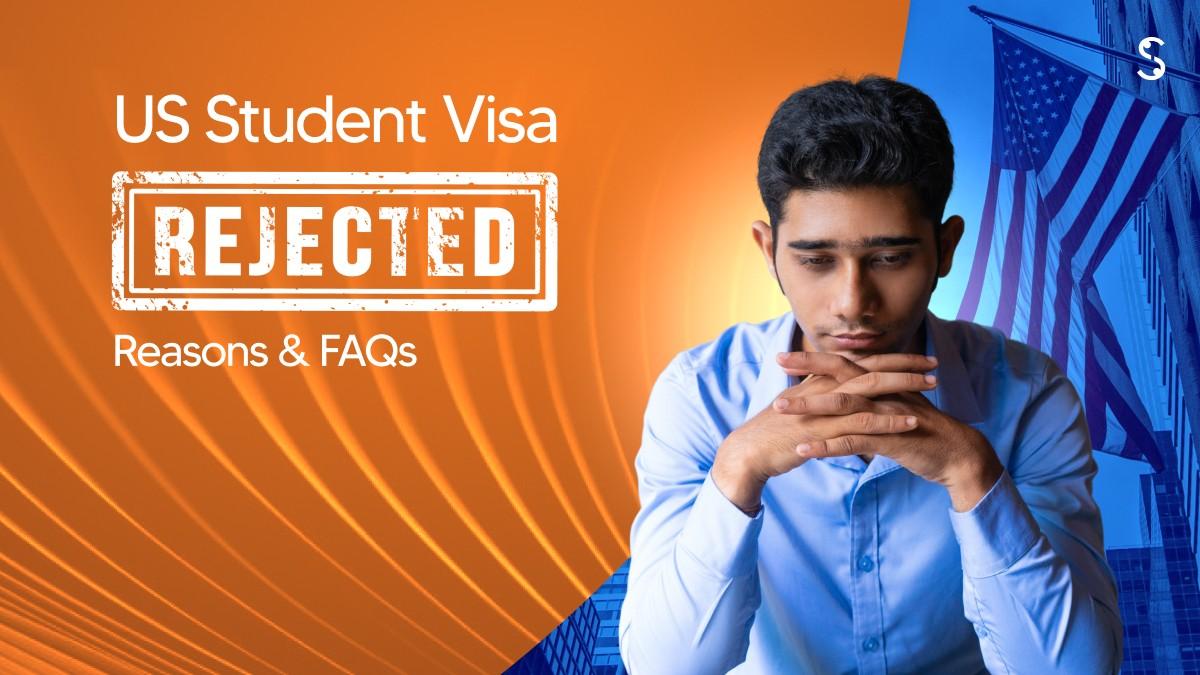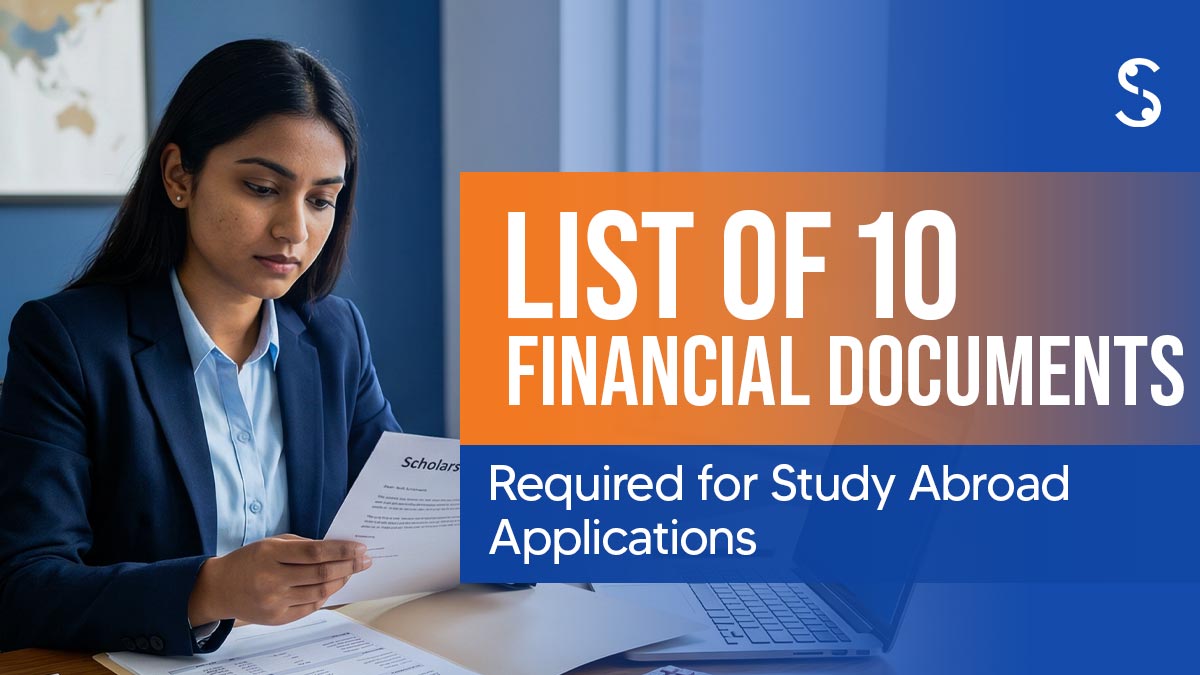
Why is the USA rejecting a student visa?
Studying in the US is a dream for many international students. The opportunity to experience a new culture, receive a top-notch education, and build a global network of friends and colleagues is incredibly exciting. However, let’s be honest, the journey to studying in the US is not always easy.
The application process can be daunting, and the disappointment of receiving a US student visa rejection can be heartbreaking and leave many with unanswered questions.
Applying for a US student visa involves gathering financial documents, academic records, and preparing for an important visa interview. It can be a bit overwhelming, and despite all your hard work, there’s always a chance your visa application might be rejected.
But you don’t have to worry! We’ll explain some common reasons why US student visas get rejected and answer some of the most frequently asked questions about the process. By understanding what might go wrong and how to avoid common mistakes, you can better prepare for your application and increase your chances of success.
15 Common Reasons for US Student Visa Rejection
Getting a US student visa requires meeting various criteria, and falling short in some areas can lead to rejection. Here are 15 common reasons why US student visa applications get denied:
1. Incomplete Application or Missing Information
This can be anything from forgetting to sign the form to not including all the required financial documents. Make sure everything is filled out thoroughly and double-check that you have all the necessary paperwork.
2. Failing to Prove Non-Immigrant Intent
This is a major one. The US visa officer needs to be convinced you will return to your home country after completing your studies. Strong ties to your home country, like a job waiting for you or family you’ll return to, can help demonstrate this.
A history of non-compliance with immigration laws or long stays in the US without proper documentation can raise suspicions about the applicant’s intent to return.
3. Poor English Language Proficiency
Most US universities require international students to demonstrate English proficiency through tests like TOEFL or IELTS. Not meeting the minimum score requirement can impact your visa application. The visa officer must be convinced of the applicant’s ability to succeed in their chosen program.
4. Insufficient Financial Support
You need to show you have enough financial resources to cover tuition and living expenses for at least the first year of study in the US. If the financial documents provided are insufficient or unclear, the visa may be denied.
If the person or entity sponsoring the applicant does not provide adequate proof of their financial capability, or if the relationship between the applicant and sponsor is unclear, this can lead to rejection.
5. Fumbling the Interview
The visa interview is your chance to make a positive impression. Be prepared, dress professionally, and answer questions confidently. Inconsistency between your application and interview responses can also be a red flag.
6. Issues with the I-20 form
The I-20, issued by your chosen university, is a crucial document. Errors or inconsistencies on it, or if it seems the university isn’t fully aware of your qualifications, can raise doubts for the visa officer.
7. Negative Social Media or Online Presence
Visa officers may review an applicant’s social media profiles. Inappropriate or controversial content can negatively influence the decision. Information found online that contradicts what was stated in the visa application can lead to rejection.
8. Inadmissibility Due to Health or Security Concerns
All visa applicants are screened for potential security risks or health issues that could disqualify them from entering the US.
9. Involvement in Political Activities
Involvement in certain political activities or affiliations with organizations deemed controversial or dangerous by US authorities can lead to denial. Any activities or associations that raise security concerns can result in rejection.
10. Doubtful Program Choice
If your chosen program seems like a drastic change from your background or future goals (e.g., switching from engineering to literature), the visa officer might question your motives.
11. Dependents’ Issues
If the applicant is bringing dependents (spouse, children), the financial and living arrangements for them must also be clearly outlined and sufficient. Issues in the visa history of dependents can affect the primary applicant’s chances.
12. Lack of Clear Study Goals
A well-defined purpose of study is crucial. Vague reasons for choosing your program or institution, or an unclear plan for how your studies fit into your future career, can raise doubts about your genuine intent to be a student.
13. Questionable Academic Fit
While you don’t need perfect grades, a significant gap in academic performance or a program vastly different from your background could suggest you’re not a serious student.
14. Employment History
An inconsistent or suspicious employment history can raise concerns about the applicant’s credibility and future plans. Applicants must often show that their current employment situation aligns with their decision to study abroad and is a logical step in their career path.
15. Travel History
Extensive travel to other countries, particularly those with high overstay rates, might raise suspicion about your true intentions. Frequent short-term stays in the US before your student visa application could also be a concern.
Frequently Asked Questions for USA Student Visa & Rejections
Here are some commonly asked questions for USA student visa & rejections:
1. Can I reapply if my student visa is rejected?
Yes, you can reapply for a student visa after it has been rejected. However, it is important to address the reasons for the rejection of your new application to increase your chances of approval.
2. How soon can I reapply after a rejection?
There’s no mandatory waiting period to reapply after a rejection. However, it’s wise to wait until you have a stronger application to submit. This could involve improving your English skills, securing additional funding, or reapplying to a different program that better aligns with your goals.
3. Will a visa rejection affect my future applications?
A single rejection won’t automatically disqualify you from future applications. However, a history of multiple rejections or rejections with serious issues (like fraud) could raise red flags for future visa officers.
4. What are some common reasons for US student visa rejection?
Incomplete applications, weak financial resources, unclear study goals, and poor English language skills are some common reasons for rejection. Ensure your application is complete, demonstrate sufficient funding, have a clear study plan, and improve your English if necessary.
5. What should I do if my visa is rejected under Section 214(b)?
Section 214(b) is a general ineligibility for visas. This rejection usually means the visa officer doubts your intent to return home after your studies. To overcome this, strengthen ties to your home country (job offer, property ownership) and demonstrate a clear study plan with a strong future career path back home.
6. What if my visa application gets a 221(g) administrative processing notice?
A 221(g) notice means the visa officer needs more information to decide on your application. This could be additional documents, verification of details, or even another interview. Respond promptly to any requests and ensure all information is accurate and complete.
7. Can I work while studying in the US on a student visa?
Yes, international students on F-1 visas can work on campus with authorization. There are limitations on work hours and types of jobs. Off-campus work opportunities require additional approvals.
8. What happens to my application if my passport expires before my visa interview?
Renew your passport as soon as possible and inform the consulate or embassy about the situation. You might need to reschedule your interview depending on processing times for the new passport.
9. What should I bring to my student visa interview?
Bring your original passport, visa application documents, I-20 form, proof of financial support, evidence of English proficiency (if applicable), and any additional documents requested in the interview invitation. Dress professionally and arrive on time.
10. Can I appeal a student visa rejection decision?
In most cases, there is no formal appeal process for a student visa rejection. However, you can choose to reapply and address any issues that led to the initial rejection.
Want to Improve Your Chances of US Student Visa Success?
Applying for a US student visa can be challenging, but knowing the common reasons for rejections can really help you improve your chances. Whether it’s showing you have enough funds, being academically ready, or providing all the right documents, each step needs careful attention.
At Shuraa Education, we’re here to help you achieve your dream of studying in the USA. Our team of experts will support you with everything you need, from evaluating your profile and finding the right university to helping with your application, budgeting, and accommodation. But wait!
We don’t just process applications – we help you build a strong case for your US student visa. We ensure all your documents are accurate and effectively communicate your qualifications and genuine intent to study.
Don’t let the fear of rejection stop you. With Shuraa Education by your side, you’ll have the support and guidance you need to overcome any obstacles. We’ll help you make sure everything is in place, giving you the best possible chance of getting your visa approved.
Contact us today for a free consultation at +91 931 999 8925 or info@shuraaeducation.com. Together, we can turn your US student visa application into a success story.
Let's Plan Your Study Abroad Journey!
Please leave your details and we will contact you shortly!
Categories
Trending Post
Latest Post

How to Study Abroad for Free or Cheap in 2026?
Many students believe that studying abroad is only for people with a lot of money. The high fees, expensive lifestyle, and foreign currencies can make it feel scary and impossible. Because of this, many students drop the idea without even checking what options are actually available. But the truth is – Studying abroad is much more […]
Read More
UCD Dublin Rankings, Fees, Courses & Reviews for Indian
For Indian students planning to study in Dublin, University College Dublin (UCD) stands out as a top choice for quality education and global exposure. As Ireland’s most globally connected university, UCD attracts students from around the world through its strong focus on research, innovation, and real-world impact. The campus culture is spirited and inclusive, making […]
Read More
List of 10 Financial Documents Required for Study Abroad Applications
Planning to study abroad is exciting, but before you pack your bags, there’s one critical step you can’t skip: proving your financial readiness. Universities and immigration authorities want assurance that you can comfortably cover tuition fees, living expenses, and other costs throughout your studies. That’s where the financial documents required for study abroad come in. These documents form the backbone of your […]
Read More
